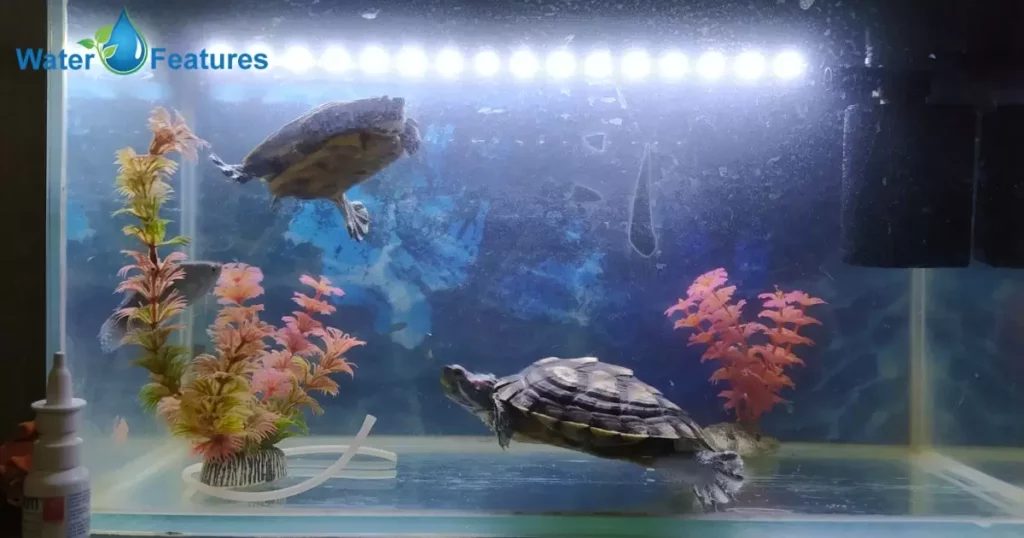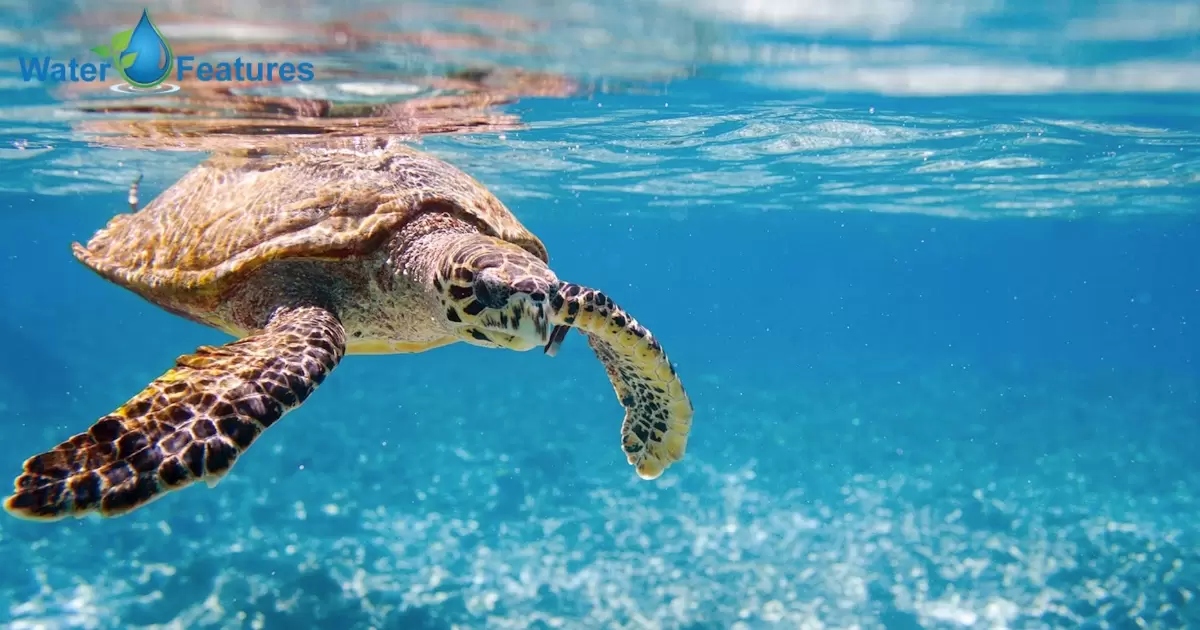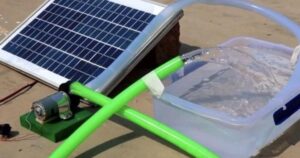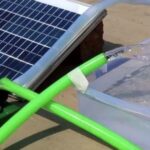Turtles are slow-moving reptiles with hard, protective shells that they carry on their backs. They live both in water and on land, and their long lifespans make them some of the oldest creatures on Earth. Turtles are known for their unique way of retracting their head and limbs into their shells when they feel threatened.
The idea of keeping a pet turtle may have crossed your mind, but before you dive in, it’s essential to ask, Can turtles live in tap water? We’re about to explore this intriguing question and unveil the secrets of providing a comfortable home for these ancient creatures in your very own living space.
Now that you’ve pondered the possibility of turtles in tap water, let’s delve deeper into the subject to ensure your pet’s well-being. For turtle enthusiasts or considering one as a pet, it’s important to learn how to provide the best habitat for them. Keep reading to discover the essential factors and steps for a happy and healthy turtle in tap water.
How To Condition Tap Water For Turtle?
To condition tap water for your turtle, start by using a dechlorinator. Add the recommended amount to remove harmful chlorine and chloramines, which can have adverse effects on aquatic life, including what tap water can do to frogs. Next, ensure the water temperature is right for your turtle’s species. Use a thermometer to adjust it. Regularly clean the tank and change the water to maintain a healthy environment.
| Step | Description |
| Use a dechlorinator | Add the recommended amount to remove harmful chlorine and chloramines from tap water. |
| Use a de-chlorinator | Ensure the water temperature is suitable for your turtle’s species and adjust it if necessary. |
| Regularly clean the tank | Maintain a clean tank environment by cleaning and changing the water as needed. |
Using a water conditioner
A water conditioner is a helpful product for making tap water safe for fish. It removes harmful chemicals like chlorine and chloramine. Just add it to your aquarium before introducing new fish. This simple step ensures a healthy and safe environment for your aquatic pets.
Let the water sit in a bucket
When you want to use tap water for your pet turtle or other aquatic animals, it’s a good idea to let the water sit in a bucket. This simple step helps remove chlorine and other chemicals that might be harmful. Just fill the bucket and leave it for 24 hours or more, and you’ll have safer water for your aquatic friends. It’s an easy way to ensure their well-being.
Partial water changes
Partial water changes are a key part of maintaining a healthy aquarium. These changes involve replacing a portion of the old aquarium water with fresh, treated water. This helps remove waste and toxins, ensuring a clean environment for your fish. Regular partial water changes are essential to keep your aquatic pets happy and thriving.
Will Tap Water Kill My Turtle?
Tap water can be safe for turtles, but it depends on where you live. In some places, tap water contains chemicals like chlorine and chloramines that can harm your pet. These chemicals are added to make the water safe for humans, but they can be harsh on turtles.
The best way to ensure your turtle stays healthy is to use dechlorinated water or invest in a water filter. This way, you can provide a safe and comfortable environment for your turtle, and they won’t have to worry about tap water harming them. Taking these steps will help you keep your shelled friend happy and thriving.
Why Isn’t Tap Water Safe For Turtles?
Tap water may seem safe for us, but it’s not the best choice for turtles. One reason is that tap water often contains chlorine and chloramine, which are added to kill harmful bacteria. While these chemicals are okay for us, they can harm turtles. Tap water may have heavy metals, like copper, which can be toxic to turtles.
Tap water’s pH levels may not be ideal for turtles. They prefer slightly acidic to neutral water, while tap water tends to be more alkaline. This pH imbalance can stress turtles and affect their health. So, for your pet’s safety, it’s best to invest in a good water conditioner and consider using filtered or dechlorinated water to create a suitable environment for your aquatic friends.
What Happens If You Put Tap Water In A Turtle Tank?
When you put tap water in a turtle tank, it’s essential to understand the potential consequences. Tap water typically contains chlorine and chloramines to make it safe for humans to drink. However, these chemicals can harm your aquatic turtle. Chlorine can irritate their skin, eyes, and respiratory system, while chloramines affect their health.
Tap water may not have the right pH and hardness levels for your turtle’s well-being. Turtles often require a slightly acidic to neutral pH level and water hardness suitable for their species. Using tap water without adjusting these factors can lead to health issues and discomfort for your pet.
Should I use distilled water for my turtle tank?
It’s a common question among turtle owners. The answer depends on the type of turtle you have and your tap water quality. Some turtles prefer clean, dechlorinated water like distilled water, while others do fine with tap water treated to remove chlorine and other harmful chemicals.
Can I Use Well Water For My Turtle Tank?
Yes, you can use well water for your turtle tank. Well, water is typically free from chlorine and other chemicals found in tap water, making it a suitable choice for your pet turtle. However, it’s essential to test the well water for any contaminants and maintain the tank’s water quality, ensuring a safe and healthy environment for your aquatic friend.
Can I use a shower or hose water for my turtle tank?
Using shower or hose water for your turtle tank is not recommended. Most tap water contains chlorine and other chemicals that can be harmful to turtles. It’s best to use dechlorinated water to ensure your pet’s health.
Is It Dangerous To Use Tap Water For Your Turtle Tank?
Using tap water for your turtle tank can be risky. Tap water often contains chlorine and chloramines, which are added to make it safe for human consumption but can harm turtles. These chemicals can irritate your turtle’s skin, eyes, and internal organs.
To ensure your turtle’s well-being, it’s best to treat tap water before adding it to the tank. You can use water conditioners or let the water sit for 24 hours to allow chlorine to dissipate. Regular water quality checks and a good filtration system can also help keep your turtle’s environment safe and clean.
What Type Of Water Can You Use To Fill Up Your Turtle Tank?
When setting up a turtle tank, it’s crucial to choose the right type of water. Most pet turtles thrive in clean, dechlorinated water. Tap water can be used, but it must be treated to remove chlorine and other harmful chemicals. You can also use spring water or distilled water, which is free from impurities.
Some turtle species may have specific water requirements. Aquatic turtles prefer deeper water, while semi-aquatic ones need both water and a dry basking area. Research your turtle’s specific needs and create a habitat that mimics their natural environment. This way, you’ll provide the best possible water source for your turtle to enjoy a comfortable and contented life.
Can I Use Water From A Hose To Fill Up My Turtle Tank?

Using water from a hose to fill up your turtle tank is possible, but there are some crucial things to consider. First, ensure the water from the hose is free from contaminants like chemicals or debris. Let the hose run for a while to clear out any stagnant water.
Maintain a consistent water temperature and use a good filtration system to keep the water clean. Test the water regularly to monitor its quality, and make sure it’s safe for your turtle’s health. By taking these precautions, you can use hose water for your turtle tank but always prioritize your pet’s well-being and comfort.
What do turtles need in their tank?
Turtles have specific needs for a happy and healthy life in their tank. First and foremost, they require clean water for swimming and drinking. A water heater is vital to maintain a comfortable temperature, usually between 75-85°F, depending on the turtle species.
Turtles also need a basking area with a heat lamp to regulate their body temperature and dry off completely. Providing a UVB light is crucial for their shell and bone health. The tank should include a proper filter to keep the water clean, and a substrate like gravel or sand to mimic their natural environment.
Can Turtles Live In Tap Water Without Water
Turtles need water to survive, but they can’t live without it for long. Water is crucial for their hydration, swimming, and maintaining a clean environment. However, they can’t survive solely outside of water. While they can spend time on land, they must return to water to stay healthy.
Without access to water, turtles can become dehydrated, and their skin can dry out. This can lead to serious health problems and even be life-threatening. So, if you’re considering keeping a turtle as a pet, make sure to provide a suitable aquatic habitat for them to thrive.
FAQ’s
Can turtles drink tap water?
Turtles may drink tap water if it’s treated to remove harmful chemicals. However, it’s safer to provide dechlorinated water specifically designed for reptiles to ensure their health.
Can I use tap water temporarily for my turtle?
If you must use tap water temporarily, make sure to dechlorinate it and maintain proper water quality. Still, it’s best to provide your turtle with a water source that meets their specific needs.
Do wild turtles live in tap water?
Wild turtles usually inhabit natural water sources like ponds and rivers, not tap water. Tap water doesn’t replicate their natural habitat, so it’s not suitable for long-term survival.
Conclusion
The well-being of turtles is closely tied to the quality of the water they inhabit. We’ve learned that tap water can be problematic due to chlorine and other chemicals. Treating it with a water conditioner or using reptile-specific water is crucial to keep these pets healthy.
Wild turtles thrive in natural water bodies, not tap water. Providing them with a habitat that replicates their natural surroundings ensures their long-term happiness and health. Remember, whether you’re an aspiring turtle owner or already have one, proper care, such as ensuring Turtles Live In Tap Water, is vital for these fascinating creatures.











